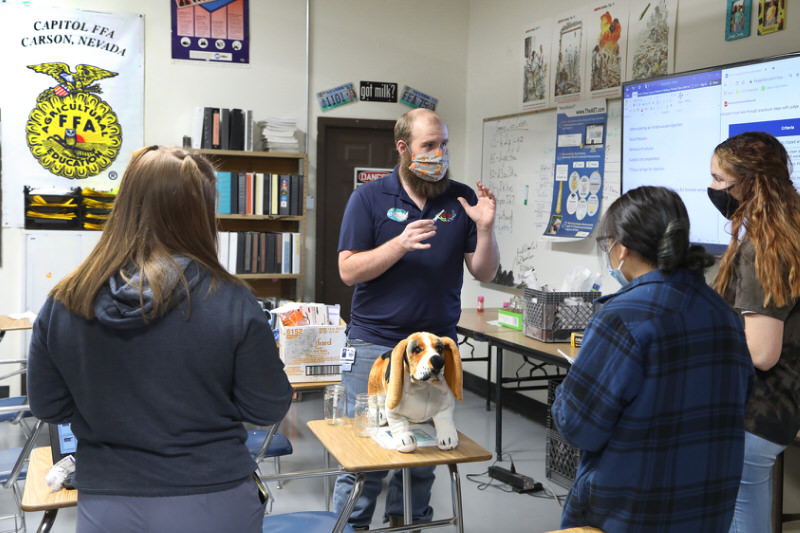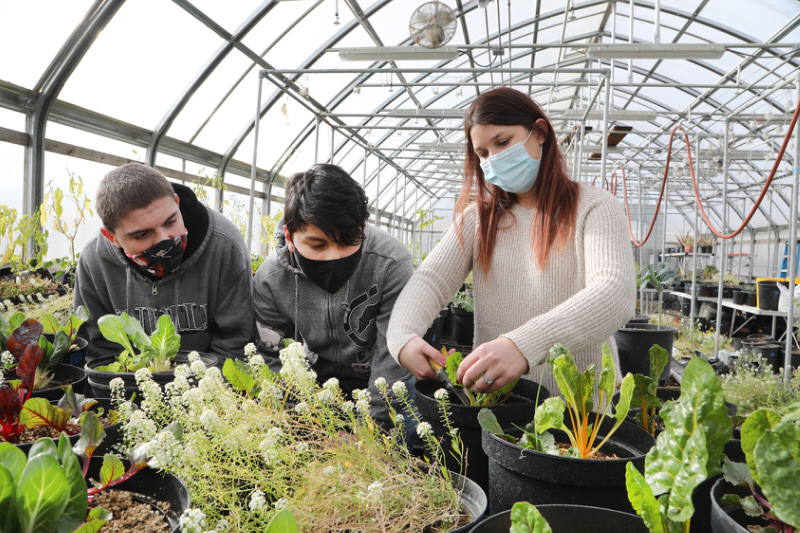Pandemic raises challenges and highlights importance of agriculture education.
The year 2020 was anything but normal for agriculture. Overall, crops performed well, but supply-chain issues, infections at meatpacking plants, and restrictions placed on agriculture events and educational programs forced a seismic shift in the industry. Ag educators — who champion the importance of bringing the community closer to their food sources and educating local populations about farming processes — were forced to move instruction to virtual platforms to continue hands-on educational programs, without the ability to be hands-on at all.
Despite the disruption, especially those related to school closures in middle and high schools and event cancellations, ingenuity prevailed and ag education continued, mostly virtually.
“During COVID-19, our program has been able to stay in touch via email,” says Kayla Holcomb, Arrowhead 4-H Livestock Club president. “Our club had a meeting to kick off the new year in October, which was socially distanced, and all members and parents were expected to wear masks. Unfortunately, due to the rise in cases, we haven’t met since.”
Virtual Reality
Some schools, including Quincy High School in Plumas County, have had to put agriculture education on hold as they stuck to full-distance-learning models in the state of California. In Carson City, where agriculture education is growing in importance, a virtual platform has worked, explains Charlie Mann, teacher and national Agriscience Teacher Ambassador, who heads the Carson City program.
“For instruction, I was able to convert all of my lessons and labs to films to help ensure that students were still able to get the same instruction as if they were in the classroom,” Mann says.
Online offerings in distance-learning platforms at Carson High School have continued for agriculture leadership, veterinary science, and greenhouse management courses, as well as other classes in the agriculture science discipline.

To date, most students in agriculture classes and 4-H clubs have not been permitted to travel to events, and a shortage of cattle made purchasing show animals difficult, if not impossible, for several groups. As a result, Nevada FFA (Future Farmers of America) has moved most of its events to a virtual platform. To encourage participation in this new realm and maintain consistent agriculture programming, the FFA launched a campaign it called 21 Virtual Experiences in 31 Days. For one month, from Sept. 22 to Oct. 22, 2020, Nevada Agriculture Education and FFA put on a series of 21 virtual experiences related to leadership development and personal growth with trainings and competitions.
“Students have voiced that they prefer to be in person participating in these classes and FFA activities,” says Heather Dye, executive director of the Nevada FFA Association and Foundation, an organization focused on honing leadership skills in the agricultural space.
However, she adds that there have been some positive takeaways from the virtual platforms. For example, programming is more accessible to some students. For older students, many have been able to focus on work (sometimes in the agriculture space) due to the flexibility of online courses, getting hands-on experience from other avenues. Because it was a good year for agriculture, those involved in personal work-based learning experiences tied to agriculture production benefitted.
The positives don’t end there. For the agriculture industry as a whole, the pandemic shone a light on the importance of agriculture to our community. Agriculture was part of many conversations, from those about food shortages and weather-related issues to transportation infrastructure and supply-chain logistics (how many times did we see empty shelves in 2020?). While many people noticed the importance of ag professionals and the vitality of agriculture as a career for the first time, others became inclined to create their own gardens to supplement food at home. This magnifying glass on the industry helped those at Urban Roots, a Reno-based nonprofit focused on improving the way communities eat and learn through garden-based education, shift focus.
“As a result, we’ve realized our vision should expand from just student learning to community learning,” says Sydney Callahan, education director for Urban Roots.
With its agriculture education geared toward younger children through site visits and school break camps, Urban Roots has long cherished hands-on learning. Without the usual camp opportunities available in 2020 — and with decisions about summer camp 2021 still in the air — Urban Roots leaders also had to pivot to virtual education. Instead of offering in-person camps, Urban Roots created Camp In A Box, a series of home activity kits that allowed for continued education accessible to all.
“We definitely miss the power of teaching and learning in person, but we’re really proud that we’ve still been able to get others to be enthusiastic about gardening through our distance-learning programs,” Callahan says.
In place of camp space, Urban Roots transformed some land into a production garden to help feed and educate families during the pandemic.
The Importance of Agriculture Education
Agriculture education is not required learning. Instead, it’s an elective program in schools and outside programs. And ag education has many benefits for all students, not just those who live on rural farms.
“In today’s society, there is a big gap between consumers of food and those who produce the food,” says Mann, who grew up on a 56-acre ranch in Wellington. “Agriculture education helps bridge that gap where students are able to learn about how agriculture is vital to their way of life.”
As an added bonus, students who learn these lessons often share them with their broader community, expanding the understanding of agricultural science and production.
In urban locations, an understanding of where food comes from and the role of agriculturists as stewards of the land isn’t emphasized outside of agriculture education. Also it is falsely assumed often that jobs in agriculture are limited to farming and ranching, although marketing, communications, and science all are viable career paths as well. Agriculture education presents students with both an understanding of these important concepts as well as of potential job opportunities they may not have considered otherwise.
“Many students have chosen their career paths based on their experiences within secondary agriculture education programs,” says Dye, who raises cattle and hogs and grows alfalfa hay in Fallon. “It helps expose them to the diverse career options related to agriculture and food production. Some examples include food scientists, veterinarians, rangeland scientists, large equipment mechanics, and farmers/ranchers.”
Looking to the future, there is discussion about expanding the number of agriculture programs in Washoe County high schools, according to Dye. Most smaller communities outside of Reno-Sparks have agriculture education or FFA programs already in place. In Reno-Sparks, North Valleys High School and the Academy of Arts, Careers and Technology offer agriculture education already.
The state of agriculture events and school-based ag education remain up in the air for 2021 as state COVID-19 restrictions and mandates continue to shift. Despite the challenges, career opportunities in agriculture continue to abound to create a valuable workforce equipped with specialized skills that are coveted as the industry continues to experience growth. Students who wish to pursue ag education can do so even if their home schools don’t currently support an ag program by getting involved in other regional 4-H clubs or agriculture groups.
Upcoming Agriculture Education Events
At the time of this writing the following 4-H and FFA events were slated for this spring. *Note: Due to changing coronavirus restrictions, all events are subject to change, so visit Nvaged.nv.gov or Agri.nv.gov for up-to-date information about events.
March 1 – 16: Nevada FFA Virtual Career and Leadership Development Event Competitions
March 17 – 19: Nevada FFA Virtual State Conventions
April (TBD): Churchill County Junior Livestock Show and Sale
May 5 – 9: Nevada Junior Livestock Show
June 20 – 25: Nevada Youth Range Camp



